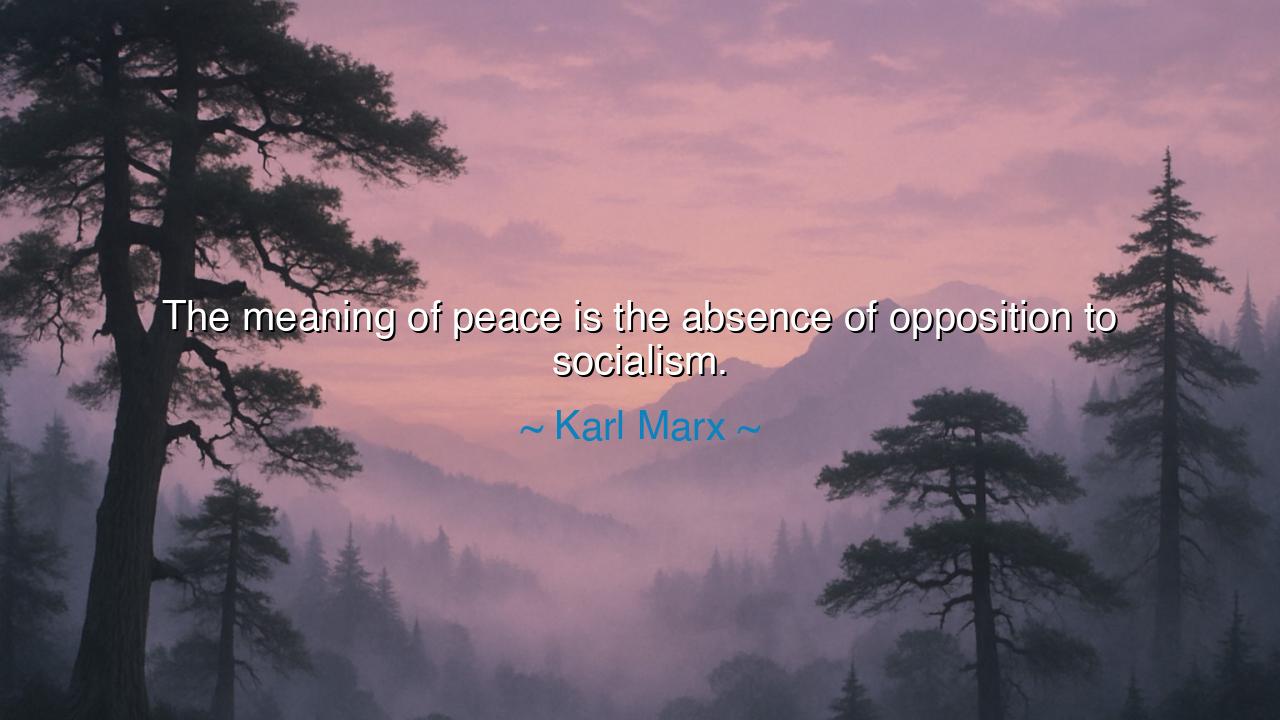
The meaning of peace is the absence of opposition to socialism.






Karl Marx, the prophet of revolution and the scourge of unjust power, once declared with uncompromising conviction: “The meaning of peace is the absence of opposition to socialism.” In this statement, sharp as iron, he does not speak of peace as a quiet meadow or a truce between weary nations. He speaks of peace as a condition of justice fulfilled, as a society where the chains of exploitation are broken, and no man dares rise to oppose the emancipation of the worker. For Marx, there could be no true harmony while capital enslaved labor; only when socialism was unopposed would humanity at last know rest.
When Marx ties peace to the absence of opposition, he is reminding us that conflict is not merely between armies, but between classes. To him, the battlefield of history is not only fields soaked in blood, but factories, parliaments, and markets where the many toil while the few thrive. So long as this contradiction remained unresolved, peace was an illusion—decorated words masking the suffering of millions. Only when the voice of capital no longer ruled, only when socialism stood uncontested, would the struggle of history find resolution.
History offers examples that illuminate his vision. After the Russian Revolution of 1917, the Bolsheviks declared peace not merely with foreign powers but within their own society—an end to the rule of landlords and industrial magnates. To them, the overthrow of opposition was the necessary prelude to harmony. Whatever one may think of their methods, their conviction was that peace without justice was falsehood. Their revolution was fueled by the belief that only by silencing the opposition of the privileged could the many taste the dignity of equality.
And yet, Marx’s words also burn with warning. For if peace is defined as the absence of opposition, then it demands vigilance: Who is silenced, and by what means? True justice cannot be born of tyranny, for if the oppressed become oppressors, then the cycle repeats. Marx’s cry was for liberation, but history teaches us that many who claimed his banner fell into the trap of silencing through fear rather than persuasion. Thus, his words remain both powerful and perilous, a flame that can illuminate or consume.
At their core, however, Marx’s words challenge the false peace of exploitation. Throughout history, empires have claimed to bring peace while their subjects starved. The Pax Romana was peace for Rome, but chains for the conquered. The silence of slaves is not peace, but despair. Marx reminds us that such peace is a lie. The only peace worthy of the name is one where oppression has ended, where the masses are not coerced into quietness, but are free to live without fear or want.
The lesson for us is clear: we must question the peace that is offered to us. Is it the peace of justice, or the peace of submission? Is it the peace of dignity, or the peace of silence? Marx points us toward a vision where peace is inseparable from equality. Without social justice, peace is but a mask. To build a true and lasting peace, we must seek a society where exploitation is not tolerated, where the dignity of labor is honored, and where the voice of the weak is not silenced by the strong.
So, O listener, take Marx’s words as both challenge and counsel: peace is not merely the absence of war, but the absence of oppression. Work not only for treaties between nations, but for justice within societies. Strive for a peace where no man’s labor enriches another unjustly, where the common good outweighs the greed of the few. And remember always: the silence of the oppressed is not peace—it is the cry of history, waiting for its answer. True peace is born when justice reigns, and when no opposition remains to the dignity of all.






AAdministratorAdministrator
Welcome, honored guests. Please leave a comment, we will respond soon